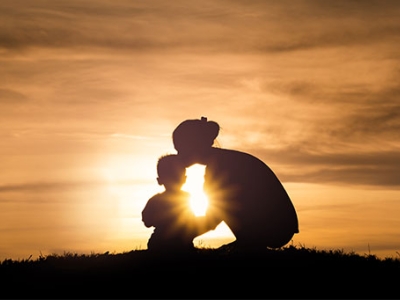
When Mother’s Day isn’t joyful
Just as God draws close to the brokenhearted, so too can we.
Growing up in my family, Mother’s Day was always a day of mixed emotions. Of course, we’d do the customary breakfast in bed for my mum, and give her a gift we’d brought home from the P&C Mother’s Day stall. We’d be thankful for mum and all she did for us—all the sandwiches she packed for us to take to school, all the soccer games she’d shuttle us to—it would be a nice day.
But in our family, it would always be a sad day, too. My mum lost her own mum (my Nanna) suddenly when I was two years old. Only as I have grown older and raised my own children, relying on my mum’s help and wisdom (and copious amounts of babysitting), have I realised how hard it must have been for her—31 years old with three children and no mum to support her.
Our story isn’t unique. Many people face Mother’s Day with renewed grief. Sons and daughters feel the loss of their mothers more acutely. Husbands and wives who cannot have children feel the sting of infertility more painfully. Single men and women who long to be married and have children long even more on days like this. And there are no words to describe the gaping hole of grief that is opened up for a mother who has lost a child.
As I was reflecting on all of this, my thoughts took me to the cross of Christ.
It had never struck me before,but Jesus really loved his mum. As he hung on the cross, facing physical pain as well as spiritual pain, enduring the wrath of God for the sake of us all, Jesus had a thought for his mother.
In John 19:26–27, we read:
‘When Jesus saw his mother there, and the disciple whom he loved standing nearby, he said to her, “Woman, here is your son”, and to the disciple, “Here is your mother”. From that time on, this disciple took her into his home.’
Take a moment to think about this: the creator of the universe understands the pain of a mother who loses a child. Jesus looked down from the cross into the face of his mother, saw her heart torn in two, and knew she couldn’t stand alone—she would need help. And so Jesus commissioned his best friend—the disciple whom he loved—to care for her.
We can be like John, too.
Romans 12:15 tells us: ‘Rejoice with those who rejoice; mourn with those who mourn’. There are indeed many reasons to rejoice on Mother’s Day. But we can also mourn with those who mourn. There is no magic bullet, nothing that can heal the pain that someone feels, but there are a few things we can do.
Pray
There are times and situations when the grief and pain is so overwhelming that we don’t know what to pray about. But God knows. Romans 8:26–27 says:
‘In the same way, the Spirit helps us in our weakness. We do not know what we ought to pray for, but the Spirit himself intercedes for us through wordless groans. And he who searches our hearts knows the mind of the Spirit, because the Spirit intercedes for God’s people in accordance with the will of God.’
When faced with our own pain, or the pain of those we love, we can take it to the throne of grace, even when we don’t know how to express it. God knows. His Son saw it firsthand. His Spirit will intercede for us. We also have promises from God’s word like Psalm 34:18: ‘The Lord is close to the brokenhearted and saves those who are crushed in spirit’.
Listen
You may also be the one who is called to be beside a friend or loved one in their grief. Nothing can prepare you for it, and no words you have will ever be enough to salve their pain. But you can listen.
My minister once reflected on the book of Job, saying: ‘The most helpful thing Job’s friends ever did was to sit in silence with him. It was all downhill once they opened their mouths’.
What was Job’s friends’ mistake? They tried to make sense of Job’s pain and find a reason for the tragic loss of his children. But we can’t presume to know the sovereign purposes of God when our loved ones face grief. Job’s friends made what they believed to be a right assessment of the world, of God and of Job—but they were off the mark.
And so we listen, we ask questions, and we let those we love share whatever they need to.
Love
Loving our grieving friend on Mother’s Day will look different person to person,but we can ask them.
• Would you like me to sit with you today?
• Would you like me to deliver a meal so you have one less thing to think about today?
• (To my single friend) Would you like to come over for brunch before church (or lunch afterwards)?
• What can I be praying for you today?
There are many who approach Mother’s Day with joy, but many who approach it with apprehension, pain and grief. Let’s love one another at all times, in all seasons, as we await for a time in the new creation when God ‘will wipe every tear from [our] eyes. There will be no more death or mourning or crying or pain, for the old order of things has passed away’ (Revelation 21:4).
---
Before training for ministry, Jenn taught courses in English Literature, History and Cultural Studies at universities in Australia and China. Jenn’s former ministry roles were in SRE, and she was a member of Youthworks' Ministry Support Team until December 2021. Jenn now serves as the Children’s Minister at Jannali Anglican Church in the South of Sydney where she lives with her husband and two children.
.jpeg)
John: the Shepherd King
John's Gospel gives more details about people, times and places than the other three gospels combined. His purpose was to assure readers that he was an eyewitness and that they could have confidence that Jesus was the Christ. Under Paul Barnett's guide 21st century readers will appreciate the geographical, historical and cultural details that authenticate John's Gospel.
For more articles from Growing Faith, subscribe to our monthly e-newsletter.
To hear about the latest books and resources from Youthworks Media, subscribe here.







